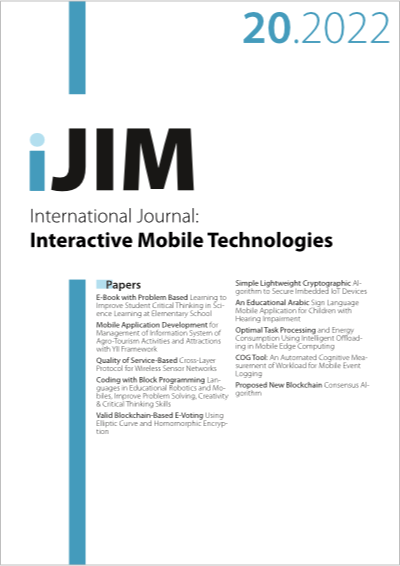COG Tool: An Automated Cognitive Measurement of Workload for Mobile Event Logging
DOI:
https://doi.org/10.3991/ijim.v16i20.33363Keywords:
Cognitive load theory, Mobile cognitive workload, mobile application, automated toolAbstract
Cognitive workload has been defined as the cognitive processing amount needed by a user in using an application. Cognitive load theory has been gaining increasing levels of importance within usability evaluations for mobile applications and the user interface. The PACMAD model has proven that cognitive workload (CL) can be seen as being a primary usability evaluation attribute in relation to mobile applications. Once the tasks that have been assigned to users within the environment of the mobile application have been performed by the evaluator, he/she subjectively measures the CL. Typically, subjective measurements are taken at a point following completion of a task and so they are static. Since these methods are static in nature, they are inappropriate for assessment of dynamic changes to the cognitive loads through user interaction. Robust measurement of the cognitive load of a user within real-time is not a simple, trivial undertaking. Lots of research studies have tried to assess the CL of users through use of various subjective measurements, though it is often the case that those approaches are unsuitable for use with real-life applications because of the high degree of intrusiveness. Automated measurement is seen as being a field that is relatively unexplored, particularly if used in relation to CL for mobile applications. The COG tool (CL automated tool) is proposed in this paper since it supports the interaction logging of the user for derivation of CL metrics that are based upon both secondary and primary tasks. Several strengths are provided by the automated measurement of CL, and it fills the gaps of a static nature of its non-objective, automated (subjective) counterpart. Within this research, in order for the study aim to be satisfied, objective CL metrics have been used by the researcher, i.e., task time, task success rate, number of touches, number of errors, duration on help, help visit count, total effort percentage and reaction on help. A total of 68 participants were recruited for the experiment, with them using an AAU mobile application through performance of a task that was predefined without there being any interference of a moderator or researcher. The findings showed that the proposed tool could fulfill the expected cognitive load monitoring functions amongst user interaction, collection of cognitive metrics and the logging of CL metrics that could be analyzed further.
Downloads
Published
How to Cite
Issue
Section
License
Copyright (c) 2022 Ashraf Saleh, Odai Enaizan

This work is licensed under a Creative Commons Attribution 4.0 International License.



